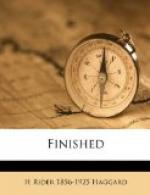Should I take the westerly road which ran over a great plain? No, for then we might be seen for miles and cut off. Moreover, even if we escaped the natives, was it desirable we should plunge into civilization just now and tell all our story, as in that case we must do. Rodd’s death was quite justified, but it had happened on Transvaal territory and would require a deal of explanation. Fortunately there was no witness of it, except ourselves. Yes, there was though—the driver Footsack, if he had got away, which, being mounted, would seem probable, a man who, for my part, I would not trust for a moment. It would be an ugly thing to see Anscombe in the dock charged with murder and possibly myself, with Footsack giving evidence against us before a Boer jury who might be hard on Englishmen. Also there was the body with a bullet in it.
Suddenly there came into my mind a recollection of the very vivid dream of Zikali which had visited me, and I reflected that in Zululand there would be little need to trouble about the death of Rodd. But Zululand was a long way off, and if we were to avoid the Transvaal, there was only one way of going there, namely through Swaziland. Well, among the Swazis we should be quite safe from the Basutos, since the two peoples were at fierce enmity. Moreover I knew the Swazi chiefs and king very well, having traded there, and could explain that I came to collect debts owing to me.
There was another difficulty. I had heard that the trouble between the English Government and Cetewayo, the Zulu king, was coming to a head, and that the High Commissioner, Sir Bartle Frere, talked of presenting him with an ultimatum. It would be awkward if this arrived while we were in the country, though even so, being on such friendly terms with the Zulus of all classes, I did not think that I, or any with me, would run great risks.
All these thoughts rushed through my brain while I considered what to do. At the moment it was useless to ask the opinion of the others who were but children in native matters. I and I alone must take the responsibility and act, praying that I might do so aright. Another moment and I had made up my mind.
Signing to Anscombe to follow me, I rode about a hundred yards or more down the nor’-westerly path. Then I turned sharply along a rather stony ridge of ground, the cart following me all the time, and came back across our own track, my object being of course to puzzle any Kaffirs who might spoor us. Now we were on the edge of the gentle slope that led down to the bush-veld. Over this I rode towards a deserted cattle kraal built of stones, in the rich soil of which grew sundry trees; doubtless one of those which had been abandoned when Mosilikatze swept all this country on his way north about the year 1838. The way to it was easy, since the surrounding stones had been collected to build the kraal generations before. As we passed over the edge of the slope in the gathering gloom, Heda cried—




